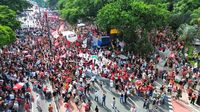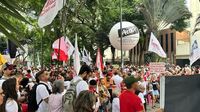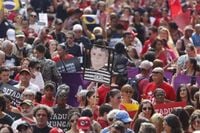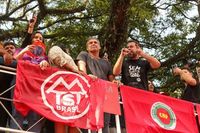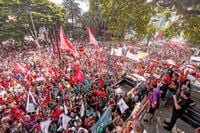On March 30, 2025, a significant protest unfolded on Avenida Paulista in São Paulo, where thousands gathered to oppose the proposed PL da Anistia, a bill that seeks to grant amnesty to individuals involved in the January 8th attacks. Organized by leftist groups such as Povo Sem Medo and Brasil Popular, the demonstration was spearheaded by Deputy Guilherme Boulos from the PSOL party, alongside other prominent political figures.
The protest peaked at approximately 6,600 participants at 3:15 PM, according to estimates by the Monitor do Debate Político, a project affiliated with the University of São Paulo (USP), and the NGO More in Common. This count was derived from aerial images analyzed by artificial intelligence, providing a precise assessment of the crowd size.
Boulos utilized the platform to criticize former President Jair Bolsonaro, who is currently facing legal challenges for his alleged involvement in a coup attempt. "The world spins, and we will still have the opportunity to take the Human Rights Commission of the Chamber and bring him a meal from the Solidarity Kitchen there in Papuda," he remarked, referencing the prison where Bolsonaro might serve time if convicted.
Accompanying Boulos was Lindbergh Farias, the government leader in the Chamber, who emphasized the urgency of the situation, stating, "This will be the week we bury this Amnesty Bill. Just voting on it is a crime." Their speeches resonated with the crowd, who started their march from Praça Oswaldo Cruz towards the former headquarters of the DOI-Codi, a notorious site of political repression during Brazil's military dictatorship.
This protest was particularly symbolic, occurring just ahead of the 61st anniversary of the military coup of 1964, which established a dictatorship in Brazil. The timing was not lost on the demonstrators, who sought to honor the victims of that era while advocating for the protection of democracy today.
Protests against the amnesty bill were not confined to São Paulo. Similar demonstrations took place in eight other Brazilian capitals, including Belo Horizonte, Recife, Curitiba, Belém, São Luís, Brasília, and Fortaleza. This widespread mobilization highlights the growing concern among leftist factions regarding the implications of the amnesty bill, which is authored by Deputy Major Vitor Hugo and aims to pardon all participants in protests since October 30, 2022.
The proposed legislation has stirred controversy, especially considering Bolsonaro's ongoing legal troubles. The Procuradoria-Geral da República (PGR) has indicated that Bolsonaro's actions during the January 8th events could be classified as an attempted coup, and the passage of this bill could potentially benefit him and others implicated.
Despite the significant turnout in São Paulo, the event faced criticism from opposition figures, who downplayed the number of attendees. Senator Ciro Nogueira quipped, "The emptiness of Boulos filled Paulista with emptiness," while Deputy Nikolas Ferreira shared a photo of the protest, humorously claiming to have counted only 44 participants.
In a previous statement, Boulos had downplayed the importance of crowd size, emphasizing that the fight against Bolsonaro's influence in the streets was paramount. "The issue is not the size of the audience. We cannot leave the streets to Bolsonarismo and remain defensive on this amnesty issue," he asserted.
Interestingly, the turnout of 6,600 was considerably lower than the 18,300 participants at a pro-Bolsonaro rally in Rio de Janeiro just two weeks prior, which raised questions about the mobilization efforts of the left. Boulos had initially projected a much larger crowd for the São Paulo event, aiming for 20,000 attendees. However, estimates from various sources, including Poder360, indicated a peak attendance of about 5,500, utilizing high-resolution aerial photos to assess the crowd.
Amid the political tensions, Boulos condemned the extreme right's attempts to undermine the current federal government and popular policies. He highlighted issues such as the exemption of income tax for those earning up to R$ 5,000 and changes to the work schedule as areas where the extreme right has actively sabotaged progress.
As the demonstration concluded, the atmosphere remained charged with political fervor, with Boulos and his supporters vowing to continue fighting against the proposed amnesty bill. The protests are expected to continue, with Boulos urging supporters to remain vigilant and engaged in the political process.
In summary, the March 30 protest in São Paulo against the PL da Anistia was a pivotal moment for leftist movements in Brazil, reflecting deep societal divisions and the ongoing struggle for democratic integrity in the face of rising right-wing sentiment. With the specter of the 1964 coup looming large, the demonstrators' call for accountability and justice resonates profoundly in Brazil's current political landscape.
